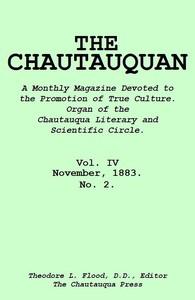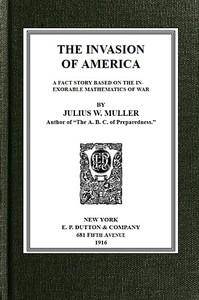Read this ebook for free! No credit card needed, absolutely nothing to pay.
Words: 97741 in 30 pages
This is an ebook sharing website. You can read the uploaded ebooks for free here. No credit cards needed, nothing to pay. If you want to own a digital copy of the ebook, or want to read offline with your favorite ebook-reader, then you can choose to buy and download the ebook.


: The Chautauquan Vol. 04 November 1883 A Monthly Magazine Devoted to the Promotion of True Culture. Organ of the Chautauqua Literary and Scientific Circle. by Chautauqua Institution Chautauqua Literary And Scientific Circle Flood Theodore L Editor - Chaut
Autumn Sympathy 80 Republican Prospects in France 80 Chautauqua to California 81 To My Books 83 Earthquakes--Ischia and Java 83 Low Spirits 85 Vegetable Villains 86 From the Baltic to the Adriatic 87 Electricity 89 Poachers in England 90 Eight Centuries With Walter Scott 91 The Great Organ at Fribourg 94 Eccentric Americans 95 Etiquette 99 Napoleon's Marshals 100 C. L. S. C. Work 102 C. L. S. C. Stationery 103 New England Branch of the Class of '86 103 C. L. S. C. Testimony 103 C. L. S. C. Reunion 104 Local Circles 105 How to Conduct a Local Circle 107 Questions and Answers 109 Outline of C. L. S. C. Studies 112 Chautauqua Normal Class 112 Editor's Outlook 115 Dr. Haygood's Battle for the Negro 115 The Political Outlook 115 History of Greece 116 A College Reform 116 Editor's Note-Book 117 Editor's Table 119 C. L. S. C. Notes on Required Readings For November 120 C. L. S. C. Notes on Required Readings in "The Chautaquan" 123 Tricks of the Conjurors 125 Talk About Books 126
REQUIRED READING
FOR THE
NOVEMBER.
GERMAN HISTORY.
From the time of Julius Caesar to the fall of the Roman Empire, a period of more than four hundred years, the greater part of the Germans were subject to Roman rule, a rule maintained only by military force. But the struggle against Rome never entirely ceased--and as Roman power gradually declined the Germans seized every opportunity to recover their liberty and in their turn became conquerors. To trace the succession of their vicissitudes during this period would be to give the narrative of a bold, vigorous, war-like people in their rude barbaric condition. We should discover even in those early times those race characteristics of strength, bravery and persistence which became so marked in later centuries; we should recognize in Hermann, the first German leader, the prophecy of the Great Charles who steps upon the scene nearly eight centuries later.
HERMANN, THE FIRST LEADER.
He it was who, with a power to organize equal to that of William of Orange, bound the German tribes in a secret confederacy, whose object it was to resist and repel the Roman armies. While still himself serving as an officer in the Roman army, he managed to rally the confederated Germans and to attack Varus's army of forty thousand men--the best Roman legions--as they were marching through the Teutoburger Forest, where, aided by violent storms, the Germans threw the Romans into panic and the fight was changed to a slaughter. When the news of the great German victory reached Rome the aged Augustus trembled with fear; he let his hair and beard grow for months as a sign of trouble, and was often heard to exclaim: "O, Varus, Varus, give me back my legions." Though Rome, under the able leadership of Germanicus, soon after defeated the Germans, yet she had been taught that the Germans possessed a spirit and a power sufficient to make her tremble for her future supremacy.
Hermann seems to have devoted himself to the creation of a permanent union of the tribes he had commanded. We may guess, but can not assert, that his object was to establish a national organization like that of Rome, and in doing this he must have come into conflict with laws and customs which were considered sacred by the people. But his remaining days were too few for even the beginning of a task which included such an advance in the civilization of the race. We only know that he was waylaid and assassinated by members of his own family in the year 21. He was then 37 years old and had been for thirteen years the leader of his people.
He was undoubtedly the liberator of Germany, having dared to grapple with the Roman power, not in its beginnings, like other kings and commanders, but in the maturity of its strength. He was not always victorious in battle, but in war he was never subdued. He still lives in the songs of the barbarians, unknown to the annals of the Greeks, who only admire that which belongs to themselves--nor celebrated as he deserves by the Romans, who, in praising the olden times, neglect the events of the later years.
GERMAN NATIONALITIES AT THE CLOSE OF THE THIRD CENTURY.
When we meet the Germans at the close of the third century we are surprised to find that the tribal names which they bore in the time of Hermann have nearly all disappeared, and new names of wider significance have taken their places. Instead of thirty to forty petty tribes, they are now consolidated into four chief nationalities with two or three inferior, but independent branches. Their geographical situation is no longer the same, migrations have taken place, large tracts of territory have changed hands, and many leading families have been overthrown and new ones arisen. Nothing but the constant clash of arms could have wrought such change. As each of these new nationalities plays a prominent part in the following centuries, a short description of them is given:
Free books android app tbrJar TBR JAR Read Free books online gutenberg
More posts by @FreeBooks

: The Invasion of America: a fact story based on the inexorable mathematics of war by Muller J W Julius Washington - Imaginary wars and battles; United States Defenses



: Cassell's History of England Vol. 3 (of 8) From the Great Rebellion to the Fall of Marlborough. by Anonymous - Great Britain History





